北京课改版六年级上册小学英语 Unit 7 单元知识点小结
北京课改版六年级英语上册 Unit 7 What are the twelve animals 知识清单

Unit 7 What are the twelve animals?一、核心词汇1. 名词: animal动物tiger老虎,虎rat老鼠rabbit兔ox公牛stamp邮票worker工人order顺序2. 动词: decide决定choose选择start开始collect收集show显露;展示3. 数词: twelve十二二、拓展词汇1. 其他生肖动物名词: dragon龙snake蛇horse马sheep羊monkey猴rooster鸡dog狗pig猪2. 序数词: first第一second第二third第三fourth第四fifth第五3. 形容词: caring关心他人的;乐于助人的friendly 友好的;亲切的brave勇敢的sick不舒服的;生病的busy忙碌的三、核心句型1. Well, we Chinese named the year after twelve animals. 噢,我们中国人以十二种动物为每一年命名。
解读: 这是一个一般过去时的陈述句。
一般过去时用来表达在过去某个时间里发生的动作或存在的状态,常和表示过去的时间状语连用,如 yesterday, last night, in 1990等。
name在此作动词,意为“命名”。
举一反三: The Jade Emperor named the years in the order they finished the race.玉皇大帝以它们完成比赛的顺序为每年命名。
2. — How often does each animal come around? 每种动物多久轮一次?— Every twelve years. 每十二年。
解读:这是询问某动作或状态发生的频率的句型及其回答。
how often表示“多久一次”,常对always, usually, often, twice a day等表示频率的副词或短语提问。
六年级上册英语第七单元知识点及练习题

【导语】英语已经发展了1400多年。
英语的最早形式是由盎格鲁-撒克逊⼈移民于5世纪带到英国的⼀组西⽇⽿曼语⽀(Ingvaeonic)⽅⾔,被统称为古英语。
以下是⽆忧考为⼤家整理的内容,欢迎阅读参考。
1.六年级上册英语第七单元知识点 ⼀、四会单词 weak(弱的) slow(慢的) himself(他⾃⼰) Ms(⼥⼠) themselves(他们/她们/它们⾃⼰) another(另⼀个) ⼆、四会词组 an old woman ⼀位⽼妇⼈ make tea 沏茶 make cake 做蛋糕 clean their rooms 打扫他们的房间 enjoy themselves 他们过得愉快 help old peopIe on the road 在路上帮助⽼⼈ make them happy 使他们开⼼ 三、句型 1.询问⾃⼰能做某事的句型: What can I do?我能做什么? 2.描述⾃⼰能做某事的句型: I can +动词原形+其他, 我能…… 四、语法 1、or的⽤法 2、反⾝代词 3、形容词性物主代词的⽤法 4、Mr、Miss与Mrs的⽤法区别2.六年级上册英语第七单元知识点 1、save water节约⽤⽔ 2、drink water喝⽔ 3、use water to clean things⽤⽔清洗东西 4、every day每天 5、in many places在许多地⽅ 6、much water许多⽔ 7、waste water浪费⽔ 8、save energy节能 9、come from=be from来⾃... 10、on Earth在地球上 11、a lot of energy许多能源 12、save trees拯救树⽊ 13、make tables做桌⼦ 14、cut down砍伐 15、too many+可数名词 16、too much+不可数名词 17、be bad for 对...有害(反) be good for对...有益 18、plastic bags塑料袋 19、glass bottles玻璃瓶 20、Earth Day地球⽇ 21、do a project做课题 22、all students所有的学⽣ 23、make a poster做⼀张海报 24、tell sb about sth告诉某⼈某事 25、tell sb to do sth告诉某⼈做某事 26、on the trees在树上(长在上⾯的) 27、in the tree在树上(不是长在上⾯的) 28、a rubbish bin⼀个垃圾桶 29、at the school gate在学校门⼝ 30、protect the Earth保护地球 31、drive(过去式)drove 32、our home我们的家园3.六年级上册英语第七单元练习题 ⼀、英汉互译。
六年级英语7单元知识点
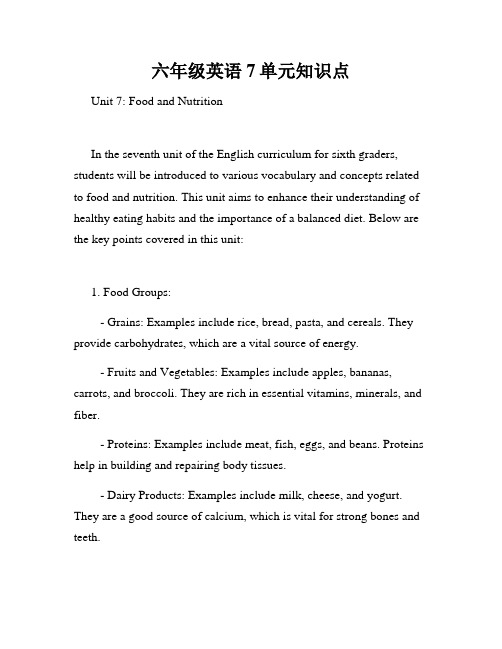
六年级英语7单元知识点Unit 7: Food and NutritionIn the seventh unit of the English curriculum for sixth graders, students will be introduced to various vocabulary and concepts related to food and nutrition. This unit aims to enhance their understanding of healthy eating habits and the importance of a balanced diet. Below are the key points covered in this unit:1. Food Groups:- Grains: Examples include rice, bread, pasta, and cereals. They provide carbohydrates, which are a vital source of energy.- Fruits and Vegetables: Examples include apples, bananas, carrots, and broccoli. They are rich in essential vitamins, minerals, and fiber.- Proteins: Examples include meat, fish, eggs, and beans. Proteins help in building and repairing body tissues.- Dairy Products: Examples include milk, cheese, and yogurt. They are a good source of calcium, which is vital for strong bones and teeth.- Fats and Oils: Examples include butter, olive oil, and nuts. While fats are important for energy, they should be consumed in moderation.2. Healthy Eating Habits:- Portion Control: It is important to eat appropriate amounts from each food group to maintain a balanced diet.- Variety: Consuming a wide variety of foods ensures the intake of different nutrients and prevents dietary deficiencies.- Limit Sugary and Processed Foods: Too much sugar and processed foods can contribute to weight gain and health problems.3. Food Preparation:- Washing Hands: Before handling food, it is crucial to wash hands thoroughly to prevent the spread of bacteria.- Food Safety: Cook food at the correct temperature to kill any harmful bacteria. Store food correctly and avoid cross-contamination.- Cooking Methods: There are various cooking methods such as boiling, frying, grilling, and baking, each with its own benefits and considerations.4. Food Vocabulary:- Useful phrases: "I'm hungry/thirsty," "Can I have...?", "I would like..."- Food Names: Vocabulary related to different food items, including fruits, vegetables, grains, and proteins.5. Mealtime Etiquette:- Table Manners: Teach students to chew with their mouth closed, use utensils appropriately, and engage in polite conversation during meals.- Sharing: Encourage sharing food and creating a pleasant dining environment with family and friends.By understanding and practicing these key points, students will be better equipped to make healthy choices and develop good eating habits that contribute to their overall well-being. Remember, healthy eating is essential for maintaining physical and mental health throughout life.In conclusion, the seventh unit of the sixth-grade English curriculum focuses on food and nutrition. Students learn about different food groups, healthy eating habits, food preparation, vocabulary related to food, and mealtime etiquette. These topics provide a foundation forstudents to develop a strong understanding of proper nutrition and make informed choices regarding their diet.。
北京课改版六年级英语上册全册知识点汇总
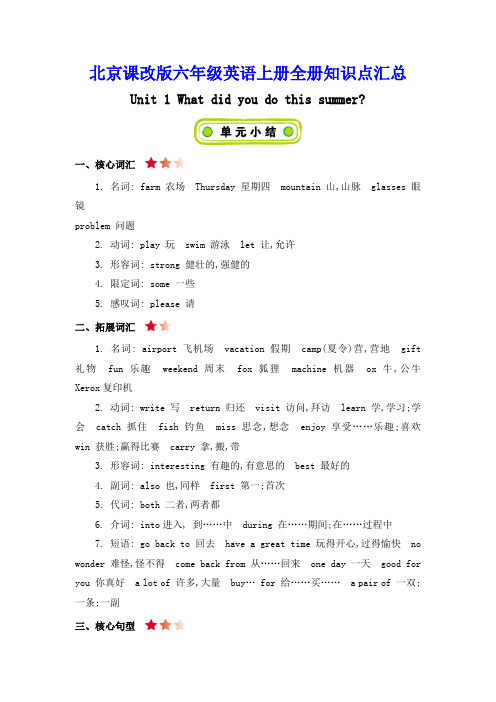
北京课改版六年级英语上册全册知识点汇总Unit 1 What did you do this summer?一、核心词汇1. 名词: farm 农场Thursday 星期四mountain 山,山脉glasses 眼镜problem 问题2. 动词: play 玩swim 游泳let 让,允许3. 形容词: strong 健壮的,强健的4. 限定词: some 一些5. 感叹词: please 请二、拓展词汇1. 名词: airport 飞机场vacation 假期camp(夏令)营,营地gift 礼物fun 乐趣weekend 周末fox 狐狸machine 机器ox 牛,公牛Xerox复印机2. 动词: write 写return 归还visit 访问,拜访learn 学,学习;学会catch抓住fish 钓鱼miss 思念,想念enjoy 享受……乐趣;喜欢win 获胜;赢得比赛carry 拿,搬,带3. 形容词: interesting 有趣的,有意思的best 最好的4. 副词: also 也,同样first 第一;首次5. 代词: both 二者,两者都6. 介词: into进入, 到……中during 在……期间;在……过程中7. 短语: go back to 回去have a great time 玩得开心,过得愉快no wonder 难怪,怪不得come back from 从……回来one day 一天good for you 你真好 a lot of 许多,大量buy… for 给……买…… a pair of 一双;一条;一副三、核心句型1. — What did you do this summer? 你今年夏天干什么了?— Oh, I went back to Canada. 噢,我回加拿大了。
解读:这是询问某人做过什么的句型及其回答,是 what 引导的一般过去时的特殊疑问句。
北京版英语六年级上册Unit 6-7重点知识点
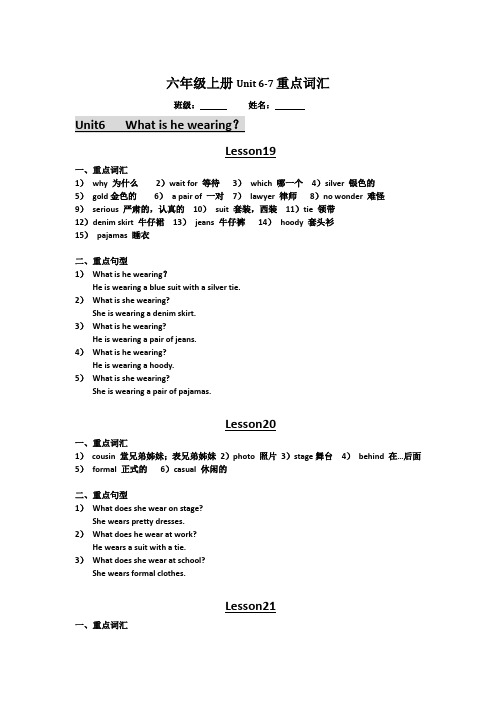
六年级上册Unit 6-7重点词汇班级:姓名:Lesson19一、重点词汇1)why 为什么2)wait for 等待3)which 哪一个4)silver 银色的5)gold金色的6)a pair of 一对7)lawyer 律师8)no wonder 难怪9)serious 严肃的,认真的10)suit 套装,西装11)tie 领带12)denim skirt 牛仔裙13)jeans 牛仔裤14)hoody 套头衫15)pajamas 睡衣二、重点句型1)What is he wearing?He is wearing a blue suit with a silver tie.2)What is she wearing?She is wearing a denim skirt.3)What is he wearing?He is wearing a pair of jeans.4)What is he wearing?He is wearing a hoody.5)What is she wearing?She is wearing a pair of pajamas.Lesson20一、重点词汇1)cousin 堂兄弟姊妹;表兄弟姊妹2)photo 照片3)stage舞台4)behind 在…后面5)formal 正式的6)casual休闲的二、重点句型1)What does she wear on stage?She wears pretty dresses.2)What does he wear at work?He wears a suit with a tie.3)What does she wear at school?She wears formal clothes.Lesson21一、重点词汇1)new 新的2)old 旧的,老的3)warm 温暖的4)cool凉爽的5)too 太…6)size 大小,尺寸7)Small 小号8)Medium 中号9)Large 大号10)hobby 爱好11)height 高度二、重点句型1)What size do you wear?I wear a Medium and she wears a Large.2)What size do you wear?I wear a 42and he wears a 34.3)What size do you wear?I wear an XS and she wears an XL.Lesson22作文以“My favorite teacher”为题写一篇小短文,介绍一下自己喜爱的老师,所教的科目,性格,相貌等,也可以写发生在你们之间的一个小故事。
北京小学英语知识点总结6年级上册
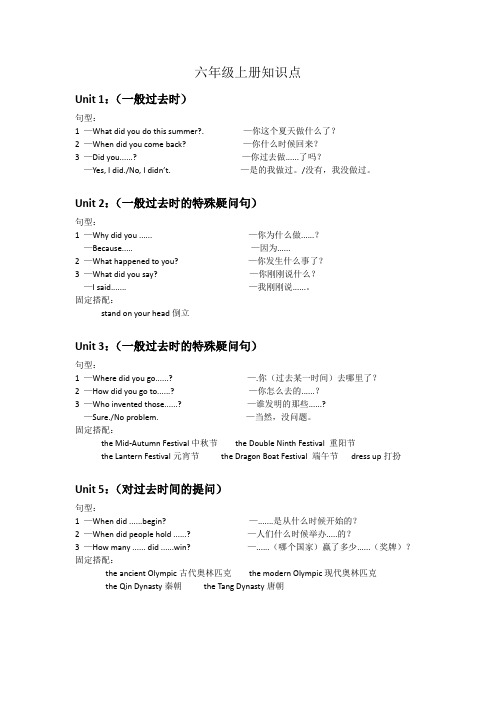
六年级上册知识点Unit 1:(一般过去时)句型:1 —What did you do this summer?. —你这个夏天做什么了?2 —When did you come back? —你什么时候回来?3 —Did you......? —你过去做......了吗?—Yes, I did./No, I didn’t. —是的我做过。
/没有,我没做过。
Unit 2:(一般过去时的特殊疑问句)句型:1 —Why did you ...... —你为什么做......?—Because..... —因为......2 —What happened to you? —你发生什么事了?3 —What did you say? —你刚刚说什么?—I said....... —我刚刚说......。
固定搭配:stand on your head倒立Unit 3:(一般过去时的特殊疑问句)句型:1 —Where did you go......? —.你(过去某一时间)去哪里了?2 —How did you go to......? —你怎么去的......?3 —Who invented those......? —谁发明的那些......?—Sure./No problem. —当然,没问题。
固定搭配:the Mid-Autumn Festival中秋节the Double Ninth Festival 重阳节the Lantern Festival元宵节the Dragon Boat Festival 端午节dress up打扮Unit 5:(对过去时间的提问)句型:1 —When did ......begin? —.......是从什么时候开始的?2 —When did people hold ......? —人们什么时候举办.....的?3 —How many ...... did ......win? —......(哪个国家)赢了多少......(奖牌)?固定搭配:the ancient Olympic古代奥林匹克the modern Olympic现代奥林匹克the Qin Dynasty秦朝the Tang Dynasty唐朝Unit 6:(穿戴)句型:1 —What is he wearing? —他穿了什么?—He is wearing ........... —他穿的是......2 —.What does he wear .....? —他在....(什么场合)穿什么?—He wears....... —他穿......。
六上U7知识点
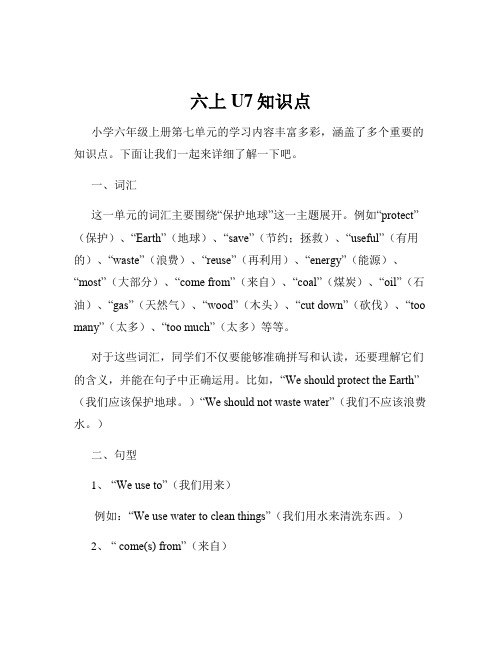
六上U7知识点小学六年级上册第七单元的学习内容丰富多彩,涵盖了多个重要的知识点。
下面让我们一起来详细了解一下吧。
一、词汇这一单元的词汇主要围绕“保护地球”这一主题展开。
例如“protect”(保护)、“Earth”(地球)、“save”(节约;拯救)、“useful”(有用的)、“waste”(浪费)、“reuse”(再利用)、“energy”(能源)、“most”(大部分)、“come from”(来自)、“coal”(煤炭)、“oil”(石油)、“gas”(天然气)、“wood”(木头)、“cut down”(砍伐)、“too many”(太多)、“too much”(太多)等等。
对于这些词汇,同学们不仅要能够准确拼写和认读,还要理解它们的含义,并能在句子中正确运用。
比如,“We should protect the Earth”(我们应该保护地球。
)“We should not waste water”(我们不应该浪费水。
)二、句型1、“We use to”(我们用来)例如:“We use water to clean things”(我们用水来清洗东西。
)2、“ come(s) from”(来自)像:“Most of our energy comes from coal and oil”(我们大部分的能源来自煤炭和石油。
)3、“We should/shouldn't”(我们应该/不应该)比如:“We should save water We shouldn't waste water”(我们应该节约用水。
我们不应该浪费水。
)在学习句型时,要注意句子的结构和时态,同时通过大量的例句和练习来加深理解和掌握。
三、语法1、一般现在时的运用表示经常发生的动作或存在的状态。
注意主语是第三人称单数时动词的变化形式。
例如:“He saves energy”(他节约能源。
)2、情态动词“should”和“shouldn't”的用法“should”表示应该做某事,“shouldn't”表示不应该做某事。
六年级上册英语素材-Unit 7 What are the twelve animals知识清单北京课改版

Unit 7 What are the twelve animals?一、核心词汇1. 名词: animal动物tiger老虎,虎rat老鼠rabbit兔ox公牛stamp邮票worker工人order顺序2. 动词: decide决定choose选择start开始collect收集show显露;展示3. 数词: twelve十二二、拓展词汇1. 其他生肖动物名词: dragon龙snake蛇horse马sheep羊monkey猴rooster鸡dog狗pig猪2. 序数词: first第一second第二third第三fourth第四fifth第五3. 形容词: caring关心他人的;乐于助人的friendly 友好的;亲切的brave勇敢的sick不舒服的;生病的busy忙碌的三、核心句型1. Well, we Chinese named the year after twelve animals. 噢,我们中国人以十二种动物为每一年命名。
解读: 这是一个一般过去时的陈述句。
一般过去时用来表达在过去某个时间里发生的动作或存在的状态,常和表示过去的时间状语连用,如 yesterday, last night, in 1990等。
name在此作动词,意为“命名”。
举一反三: The Jade Emperor named the years in the order they finished the race.玉皇大帝以它们完成比赛的顺序为每年命名。
2. — How often does each animal come around? 每种动物多久轮一次?— Every twelve years. 每十二年。
解读:这是询问某动作或状态发生的频率的句型及其回答。
how often表示“多久一次”,常对always, usually, often, twice a day等表示频率的副词或短语提问。
北京版-英语-六年级上册-Unit 7 How often does each animal come around 频度副词拓展
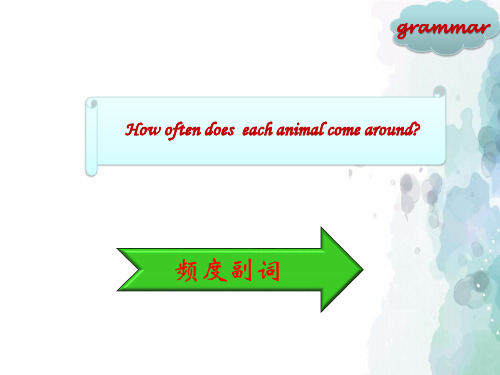
How often does each animal come around?
频度副词
频度副词短语
We clean his room once a week.(一周一次) You clean his room twice a week.(一周两次) We cleans her room three times a week. (一周三次) I cleans his room four times a week. (一周四次) I cleans her room five times a week. (一周五次)
每个月四次 four times a month
wash my clothes
Practice
I
一天三次 three times a day
每年两次 twice a year
每周一次 go to the cinema
once a week
如何提问? 对划线部分提问:
I play football once a week. How often do you play football?
一周两次
一年六次
twice a week six times a year
Practice
LilIy
每天 everyday
一个月四次 four times a m onth 每周两次 twice a week
listen once a day 每周两次 twice a week
Translate the phrases below:
一天一次 once a day
一天两次 twice a day
一 周三次 three times a week
北京版六年级英语上册第七单元知识点

Unit 7 知识点Lesson 23一、动词原形及现在分词(需背、默)name—named 命名enter—entered 进入bear—born 生/出生二、重点词组(需背、默)1. the year of the tiger 虎年2. the Chinese calendar 农历3. how often 多久一次4. every twelve years 每十二年5. birth--year animal 生肖6. name after…以…命名7. was/were born 出生三、重点句型(需背、默)1.---- How often does each animal come around? 每种动物多长时间轮回一次?---- Every twelve years. 每十二年。
2.---- How often does the girl go to the dentist? 这个女孩多长时间看一次牙医?---- Every six months. 每六个月。
3.---- How often do the boys practice together?这些个男孩们多长时间一起练习一次?---- Every three days. 每三天。
4.They are Rat, Ox, Tiger, Rabbit, Dragon, Snake, Horse, Sheep, Monkey, Rooster, Dog, and Pig. 它们是鼠、牛、虎、兔、龙、蛇、马、羊、猴、鸡、狗和猪。
四、我会说1.Happy Chinese New Year! 春节快乐!2.I was born in the year of the tiger. 我出生于虎年。
3.My birth--year animal is the tiger. 我的生肖是虎。
4.How interesting! 多有趣呀!5.I was born in the year of the horse, so my birth--year animal is the horse.我是在马年出生的,所以我的生肖是马。
最新北京课改版小学英语六年级上册单元知识总结(全册)

最新北京课改版小学英语六年级上册单元知识总结(全册)Unit 1 What did you do this summer?During the summer。
I went to a farm with my family。
We stayed there for a week and had a great time。
We played with the animals and went fishing in the pond。
It was a lot of fun.One day。
we went hiking in the mountains。
It was a bit difficult。
but we managed to reach the top。
The view was amazing。
We could see for miles and miles。
I took some photos with my glasses.On another day。
we had a problem with our car。
It wouldn't start。
We had to call a mechanic to come and fix it。
It took a few hours。
but we eventually got it working again.Overall。
it was a really enjoyable n。
I learned a lot about farm life and nature。
I also got to spend some quality time with my family.I came back from n feeling refreshed and happy。
I'm already looking forward to next year's trip!biscuit5.介词:with和,带着三、课文解析及改写本单元主要讲述了小女孩Lucy在踢足球时不小心受伤,并被送到医院检查的故事。
六年级上册英语Module7Let39;slookback重点辞汇总结

六年级上册英语Module 7 Let's look back重点辞汇总结六年级上册英语module7Let'slookback重点辞汇总结Unit1whatAreweGoingtoDoforourHoliday?一、单词双基★alotof许多......★lot许多★clothes衣服★havefun玩得高兴★havebeento到过★instead代替★plan打算cruise漫游;游弋dimsum点心pearl珍珠thePearlRiver珠江temple庙theSixBanyanTemple六榕寺yummy味道好的;好吃的二、短语双基.allofus咱们大伙儿2.buynewclothes买新衣服3.climbtheBaiyunHill爬白云山4.dosomereading念书5.eatdimsumatGuangdongrestaurant在广东酒家吃点心6.goodidea好主意7.goonthePearlRivercruise游珠江8.goshoppinginXiajiuRoad在下九路购物9.GuangzhouArtmuseum广州艺术博物馆0.havebeento到过1.havealotoffun玩得很高兴2.havefun玩得高兴3.havelunch吃午饭4.manytimes多次5.playcards打牌6.schoolholiday学校假期7.seewhitetiger看白老虎8.surftheNet上网9.takephotos照相20.thePearlRiver珠江21.theSixBanyanTemple六榕寺22.XiangjiangZoo香江野生动物园23.wanttodosth.想要做某事24.watchbirds观鸟25.writealetter写信三、句型双基.whatareyougoingtodo?你打算干什么?IamgoingtoclimbBaiyunHill.我打算去爬白云山。
英语六年级七单元知识点
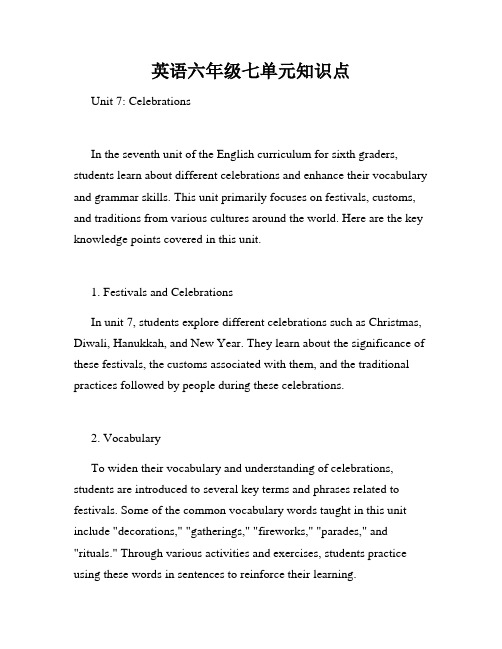
英语六年级七单元知识点Unit 7: CelebrationsIn the seventh unit of the English curriculum for sixth graders, students learn about different celebrations and enhance their vocabulary and grammar skills. This unit primarily focuses on festivals, customs, and traditions from various cultures around the world. Here are the key knowledge points covered in this unit.1. Festivals and CelebrationsIn unit 7, students explore different celebrations such as Christmas, Diwali, Hanukkah, and New Year. They learn about the significance of these festivals, the customs associated with them, and the traditional practices followed by people during these celebrations.2. VocabularyTo widen their vocabulary and understanding of celebrations, students are introduced to several key terms and phrases related to festivals. Some of the common vocabulary words taught in this unit include "decorations," "gatherings," "fireworks," "parades," and "rituals." Through various activities and exercises, students practice using these words in sentences to reinforce their learning.3. GrammarUnit 7 also reinforces important grammar concepts, such as simple past tense, present perfect tense, and comparatives. Students engage in activities that help them understand when and how to use these grammatical structures correctly. They practice constructing sentences using the appropriate verb tense and learn to compare different aspects related to celebrations.4. Cultural AwarenessIn this unit, students develop a sense of cultural awareness by learning about celebrations from different countries and cultures. They gain insights into the diversity of traditions and customs around the world, fostering an appreciation for different cultural practices and beliefs.5. Reading and ComprehensionThroughout unit 7, students read passages and texts that describe various celebrations. They enhance their reading comprehension skills by answering questions, summarizing information, and making inferences. These activities not only improve their reading abilities but also allow them to gain a deeper understanding of different cultural celebrations.6. Speaking and ListeningTo enhance their communication skills, students participate in speaking and listening activities related to celebrations. They engage in conversations, ask and answer questions, and share their own experiences of different festivals. By actively participating in these activities, students develop their oral fluency and listening comprehension.7. WritingIn this unit, students also work on their writing skills by composing paragraphs and short essays about different celebrations. They learn to organize their ideas coherently, use appropriate vocabulary and grammar, and express their thoughts effectively in written form.ConclusionThe seventh unit of the English curriculum for sixth-grade students offers a comprehensive exploration of celebrations from different cultures. Through vocabulary expansion, grammar reinforcement, cultural awareness, reading comprehension, speaking and listening activities, and writing exercises, students develop a well-rounded understanding of celebrations and enhance their English language skills.Note: The above text serves as an example of how the requested article might be structured and written. The actual content may vary based on specific knowledge points covered in the English curriculum for sixth graders in your region.。
Unit7Whatarethetwelveanimals知识点讲解精选精练(讲义)北京版英语六年级上
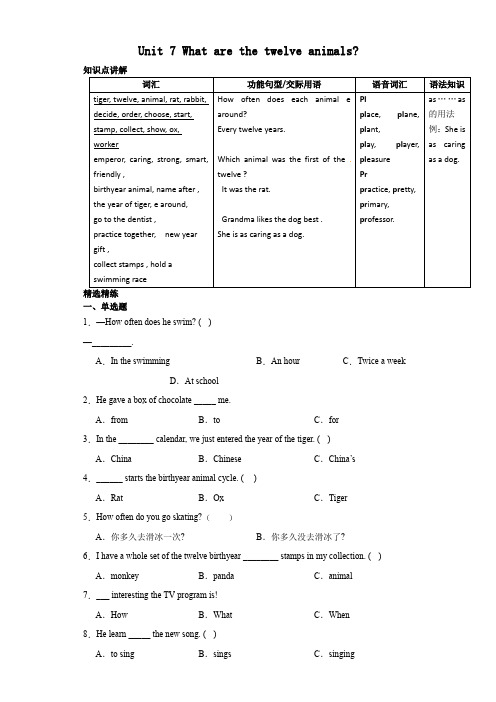
Unit 7 What are the twelve animals? 知识点讲解smart, How often does each animal e around?Every twelve years.Which animal was the first of the twelve ?It was the rat.Grandma likes the dog best .She is as caring as a dog.精选精练一、单选题1.—How often does he swim? ()—_________.A.In the swimming B.An hour C.Twice a weekD.At school2.He gave a box of chocolate _____ me.A.from B.to C.for3.In the ________ calendar, we just entered the year of the tiger. ()A.China B.Chinese C.China’s4.______ starts the birthyear animal cycle. ()A.Rat B.Ox C.Tiger5.How often do you go skating?()A.你多久去滑冰一次?B.你多久没去滑冰了?6.I have a whole set of the twelve birthyear ________ stamps in my collection. () A.monkey B.panda C.animal7.___ interesting the TV program is!A.How B.What C.When8.He learn _____ the new song. ()A.to sing B.sings C.singing二、词汇选择题选出不同类的一项。
小学六年级英语上册第7单元知识点梳理及检测
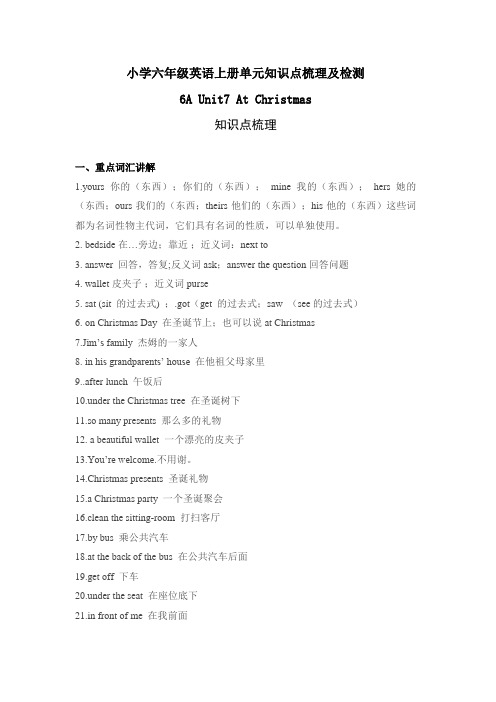
小学六年级英语上册单元知识点梳理及检测6A Unit7 At Christmas知识点梳理一、重点词汇讲解1.yours 你的(东西);你们的(东西);mine 我的(东西); hers她的(东西;ours我们的(东西;theirs他们的(东西);his他的(东西)这些词都为名词性物主代词,它们具有名词的性质,可以单独使用。
2. bedside在…旁边;靠近;近义词:next to3. answer 回答,答复;反义词ask;answer the question回答问题4. wallet皮夹子;近义词purse5. sat (sit 的过去式) ;.got(get 的过去式;saw (see的过去式)6. on Christmas Day 在圣诞节上;也可以说at Christmas7.Jim’s family 杰姆的一家人8. in his grandparents’ house 在他祖父母家里9..after lunch 午饭后10.under the Christmas tree 在圣诞树下11.so many presents 那么多的礼物12. a beautiful wallet 一个漂亮的皮夹子13.You’re welcome.不用谢。
14.Christmas presents 圣诞礼物15.a Christmas party 一个圣诞聚会16.clean the sitting-room 打扫客厅17.by bus 乘公共汽车18.at the back of the bus 在公共汽车后面19.get off 下车20.under the seat 在座位底下21.in front of me 在我前面22.the woman beside him 在他旁边的女士23. walk to the driver 走向司机24.ask him to take it the police station请求他把它带到警察局25.the picture of the football足球的图片二、重点句型讲解1. This one is from Grandma. It’s yours.这个是爷爷送的。
六上英语unit7知识点总结
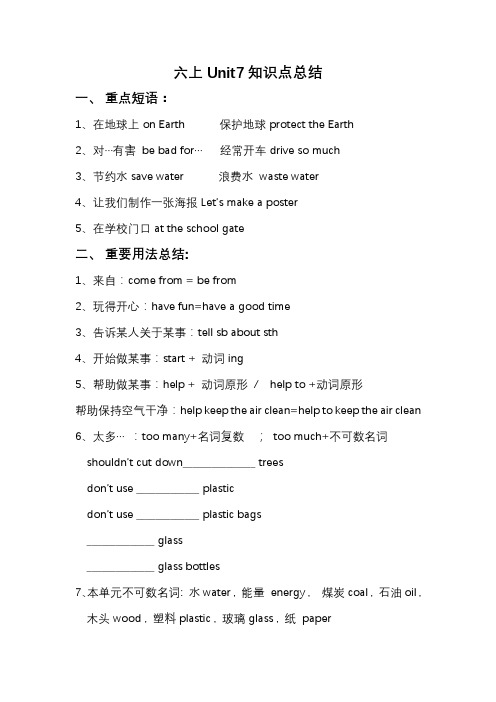
六上Unit7知识点总结一、重点短语:1、在地球上on E arth 保护地球protect the E arth2、对…有害b e bad for…经常开车drive so much3、节约水save water 浪费水waste water4、让我们制作一张海报L et’s make a poster5、在学校门口at the school gate二、重要用法总结:1、来自:come from = be from2、玩得开心:have fun=have a good time3、告诉某人关于某事:tell sb about sth4、开始做某事:start + 动词ing5、帮助做某事:help + 动词原形/ help to +动词原形帮助保持空气干净:help keep the air clean=help to keep the air clean 6、太多… :too many+名词复数;too much+不可数名词shouldn’t cut down_______________ treesdon’t use _____________ plasticdon’t use _____________ plastic bags______________ glass______________ glass bottles7、本单元不可数名词: 水water , 能量energy , 煤炭coal , 石油oil , 木头wood , 塑料plastic , 玻璃glass , 纸paper三、重点语法:1、使用use 再利用reuse 有用的useful使用/再利用某物去做某事:use/reuse sth to +动原使用水去清洗东西:use water to clean things使用木头去制作许多其他的东西:use wood to make many other things使用塑料去制作袋子和瓶子:use plastic to make bags and bottles 再利用纸去制作一个箱子:reuse paper to make a box再利用一个塑料瓶去制作一个玩具:reuse a plastic bottle to make a toy2、should 和shouldn’t 是情态动词,后面要接动词原形。
六年级英语上册 各单元重点知识 北京市版完美版

六年级英语上册各单元重点知识北京市版完美版Unit 1: Greetings and Introductions- Basic greetings: Hello, Hi, Good morning, Good afternoon, Good evening, How are you?- Introducing oneself: My name is..., I am..., Nice to meet you.- Asking and answering about age, hobbies, and families.Unit 2: Classroom Objects- Asking and answering questions about classroom objects: What is this? What is that?- Prepositions of location: in, on, under, between, next to.Unit 3: Daily Routines- Daily activities: wake up, get up, brush teeth, wash face, have breakfast, go to school, have lunch, do homework, go to bed.- Asking and answering questions about daily routines: What do you do in the morning? What time do you go to bed?- Time expressions: in the morning, in the afternoon, in the evening, at night.Unit 4: Fruits and Vegetables- Describing taste and preference: sweet, sour, like, dislike.- Countable and uncountable nouns: a/an, some.Unit 5: Numbers 1-100- Numbers 1-20: one, two, three, four, five, six, seven, eight, nine, ten, eleven, twelve, thirteen, fourteen, fifteen, sixteen, seventeen, eighteen, nineteen, twenty.- Numbers 20-100: twenty-one, twenty-two, thirty, forty, fifty, sixty, seventy, eighty, ninety, one hundred.- Counting objects and people.- Asking and answering about quantity: How many...?Unit 6: Colors- Basic colors: red, blue, green, yellow, orange, purple, pink, black, white.- Describing objects by their colors.- Expressions: What color is it? It is...Unit 7: Weather- Basic weather conditions: sunny, cloudy, rainy, snowy, windy.- Asking and answering questions about the weather: What is the weather like today? It is...- Expressions: It is hot/cold/warm.Unit 8: Clothes- Basic clothing items: shirt, pants, dress, skirt, hat, shoes.- Describing clothes: color, size.- Expressions: I am wearing..., He/She is wearing...以上是六年级英语上册各单元重点知识的概要内容。
六年级上册第七单元知识点

六年级上册第七单元知识点
六年级上册第七单元的知识点主要包括以下部分:
1. 形容词和副词的最高级形式。
形容词和副词的最高级用于描述三者或三者以上的人或事物中的最高或最后一名。
形容词最高级的构成是在形容词后加“est”,副词最高级的构成是在副词后加“most”。
例如,形容词“happy”的最高级是“happiest”,副词“quickly”的最高级是“quickest”。
2. 表示顺序的词汇。
例如,first、second、third等,这些词用于描述事物发生的顺序或排列的顺序。
3. 表示比较级的词汇。
例如,than、less、more等,这些词用于描述两个事物之间的差异。
4. 表示最高级的词汇。
例如,the most、the least等,这些词用于描述三个或三个以上事物中的最高或最低。
5. 句型结构。
例如,“I am the tallest in my class”表示“我是我们班里最高的”。
6. 常用的形容词和副词的比较级和最高级形式。
例如,good的比较级是better,最高级是best;well的比较级是better,最高级是best。
7. 注意事项。
在比较级和最高级的表达中,需要注意单数名词的所有格和复数名词的所有格形式。
例如,“John’s height”表示“约翰的高度”,“the students’ marks”表示“学生们的学习成绩”。
以上是六年级上册第七单元的主要知识点,通过掌握这些知识点,学生可以更好地理解课文内容,提高语言表达能力。
- 1、下载文档前请自行甄别文档内容的完整性,平台不提供额外的编辑、内容补充、找答案等附加服务。
- 2、"仅部分预览"的文档,不可在线预览部分如存在完整性等问题,可反馈申请退款(可完整预览的文档不适用该条件!)。
- 3、如文档侵犯您的权益,请联系客服反馈,我们会尽快为您处理(人工客服工作时间:9:00-18:30)。
Unit 7 What are the twelve animals?
一、核心词汇
1. 名词: animal动物tiger老虎,虎rat老鼠rabbit兔ox公牛stamp邮票worker工人order顺序
2. 动词: decide决定choose选择start开始collect收集show显露;展示
3. 数词: twelve十二
二、拓展词汇
1. 其他生肖动物名词: dragon龙snake蛇horse马sheep羊monkey猴rooster鸡dog狗pig猪
2. 序数词: first第一second第二third第三fourth第四fifth第五
3. 形容词: caring关心他人的;乐于助人的friendly 友好的;亲切的brave勇敢的sick不舒服的;生病的busy忙碌的
三、核心句型
1. Well, we Chinese named the year after twelve animals. 噢,我们中国人以十二种动物为每一年命名。
解读: 这是一个一般过去时的陈述句。
一般过去时用来表达在过去某个时间里发生的动作或存在的状态,常和表示过去的时间状语连用,如 yesterday, last night, in 1990等。
name在此作动词,意为“命名”。
举一反三: The Jade Emperor named the years in the order they finished the race.玉皇大帝以它们完成比赛的顺序为每年命名。
2. — How often does each animal e around? 每种动物多久轮一次?
— Every twelve years. 每十二年。
解读:这是询问某动作或状态发生的频率的句型及其回答。
how often表示“多久一次”,常对always, usually, often, twice a day等表示频率的副词或短语提问。
举一反三: — How often does he phone you? 他多久给你打一次电话?
— Twice a week. 一周两次。
— How often do his parents let him watch TV? 他父母多久让他看一次电视?
— Twice a day. 每天两次。
3. Who decided the order of the birth-year animals, Yangyang?洋洋,谁决定了生肖的顺序呢?
解读: 这是由疑问词who引导的一般过去时的特殊疑问句,用来询问谁在过去做了什么。
who在句中作主语。
举一反三: Who went to the park yesterday?昨天谁去公园了?
Who got the prize today? 今天谁得奖了?
4. — Which animal was the first of the twelve?十二生肖里哪个动物是第一个? — It was the rat. 鼠。
解读: 这是由which引导的一般过去时的特殊疑问句, 用来询问第一个是什么。
如果指的是现在已经形成习惯了的事物,我们可以用一般现在时,在特定的情况下 (如故事中) 可以用一般过去时。
first是序数词,意为“第一”,前面常加定冠词the。
举一反三: — Which season is the second of the four?在四季中哪一个季节是第二个?
— It is summer. 夏季。
— Which month is the third of the year?一年中哪个月是第三个?
— It is March. 三月。
5. I’ll show them to you. 我将把它们展示给你看。
解读: 这是一个一般将来时的陈述句。
show sth to sb = show sb sth 意为“把某物展示给某人看”。
举一反三: He will go to Beijing tomorrow. 明天他要去北京。
Lingling will see the pandas and monkeys, too. 玲玲也要去看熊猫和猴子。
6. I work as hard as an ox. 我像牛一样勤劳。
解读: 这是表达和某人/某物一样的句型。
as … as意为“和……一样”。
使用时要注意,第一个as为副词,第二个as为连词。
其否定式为“not as/so + 形容词/副词 + as”。
举一反三: My brother is as smart as a monkey. 我弟弟像猴子一样聪明。
四、了解句型
1. What do you mean? 你是什么意思?
解读: 这是一个由what引导的一般现在时的特殊疑问句。
2. What a surprise!真是个惊喜!
解读: 这是一个由what引导的感叹句。
感叹句可以是一个词或一个短语。
如: Happy Chinese New Year! 中国新年快乐! Happy Year of the Tiger! 虎年快乐!How interesting! 真有趣!
3. I know you were born in the year of the tiger. 我知道你是在虎年出生的。
解读: 这是一个含有宾语从句的句子,主句是I know,从句you were born in the year of the tiger在句中作宾语。
